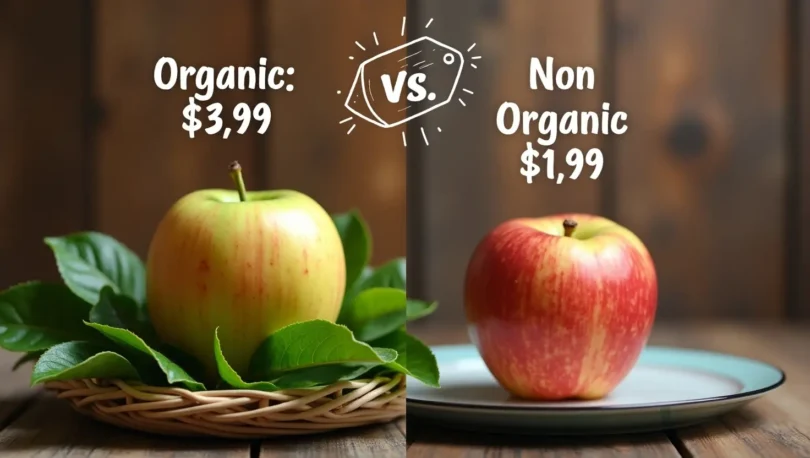The debate between organic vs non-organic food has become a prominent conversation in today’s food industry. As more consumers strive to make healthier, more sustainable choices, the demand for organic products has surged. However, organic foods often come with a significantly higher price tag, leading many to question if they are truly worth the extra cost.
Concerns over health, the environment, and the impact of farming practices have driven the conversation around organic foods. People are increasingly worried about pesticide residues, genetically modified organisms (GMOs), and the environmental consequences of conventional farming. At the same time, organic food remains a more expensive option, leaving many shoppers wondering if the benefits justify the price difference.
In this article, we’ll explore whether organic food really lives up to its premium price. We’ll examine the differences between organic and non-organic products, assess the health and environmental benefits of choosing organic, and provide insights into whether the higher cost is truly justified.
Headlines
What’s the Difference Organic vs Non-Organic?
- What is Organic Food?
- What is Non-Organic Food?
- Understanding Food Labels: What Do They Really Mean?
Health and Environmental Impact – Does Organic Really Matter?
Is Organic Worth the Higher Price?
- Why Is Organic Food More Expensive?
- Weighing the Value of Organic Food
- Making Organic Food More Affordable
What’s the Difference Organic vs Non-Organic?
When shopping for groceries, you’ve likely noticed the increasing availability of organic products alongside their non-organic counterparts. But what exactly sets them apart? The distinction goes beyond just price—organic and non-organic foods differ in farming practices, chemical usage, and even labeling. Understanding these differences can help you make informed choices about what you put on your plate.
Organic vs Non-Organic : What is Organic Food?
Organic food refers to produce, dairy, meat, and processed products that are grown and produced without synthetic pesticides, herbicides, or fertilizers. The USDA Organic Certification sets strict guidelines that organic farmers must follow, including:
- No synthetic pesticides, herbicides, or fertilizers.
- No genetically modified organisms (GMOs).
- No artificial preservatives, colors, or flavors in processed organic foods.
- Livestock raised without antibiotics or synthetic hormones.
- Animals must have access to outdoor environments and be fed organic, non-GMO feed.
Organic farming practices emphasize soil health, biodiversity, and sustainability. Many proponents of organic food argue that these methods result in more nutritious and environmentally friendly products.
Organic vs Non-Organic : What is Non-Organic Food?
Non-organic (or conventional) food, on the other hand, is grown and produced using modern agricultural techniques, which often involve:
- The use of synthetic pesticides, herbicides, and chemical fertilizers to enhance growth and yield.
- Genetic modification (GMOs) to improve resistance to pests and diseases or enhance nutritional value.
- The use of antibiotics and synthetic hormones in livestock to promote growth and prevent disease.
- Intensive farming methods that prioritize high yields and cost-effectiveness.
While non-organic food is often more affordable and widely available, concerns have been raised about potential health risks associated with pesticide residues, antibiotics in meat, and the long-term effects of consuming genetically modified crops.
Understanding Food Labels: What Do They Really Mean?
With so many food labels on grocery store shelves, it can be confusing to understand what each one represents. Here’s a quick breakdown:
- USDA Organic: The gold standard for organic certification, ensuring food meets strict organic farming guidelines.
- Non-GMO: Indicates that the product does not contain genetically modified organisms but may still be grown using synthetic chemicals.
- Natural: A vague term with no strict regulations—products labeled “natural” may still contain additives or preservatives.
- Pesticide-Free: Suggests minimal or no pesticide use but does not necessarily mean the product is organic.
Understanding these labels can help you navigate your options more effectively, ensuring that you get what you expect when choosing organic or non-organic foods.
In the next section, we’ll explore whether organic food truly offers health and environmental benefits that justify its higher cost.
Health and Environmental Impact – Does Organic Really Matter?
One of the biggest debates surrounding organic food is whether it actually provides significant health and environmental benefits compared to non-organic options. While many consumers believe that organic food is the healthier and more sustainable choice, skeptics argue that the differences may not be as impactful as they seem. Let’s take a closer look at the potential benefits of organic food in terms of both personal health and environmental sustainability.
Organic vs Non-Organic : Health Benefits of Organic Food
1. Lower Exposure to Pesticides and Chemicals
One of the key reasons people choose organic food is to avoid synthetic pesticides, herbicides, and fertilizers commonly used in conventional farming. Research has shown that non-organic produce may contain traces of these chemicals, which can accumulate in the body over time. While regulatory agencies set limits on pesticide residue, some studies suggest that long-term exposure—even at low levels—could be linked to health risks such as hormone disruption, neurological issues, and an increased risk of certain cancers.
Organic farming, on the other hand, relies on natural alternatives like crop rotation, composting, and biological pest control to maintain crop health without synthetic chemicals. This significantly reduces consumers’ exposure to harmful residues.
2. Higher Nutrient Density?
Some studies indicate that organic foods, particularly fruits and vegetables, may contain higher levels of certain vitamins, antioxidants, and minerals compared to conventionally grown counterparts. This is believed to be due to organic farming practices that emphasize soil health, which can lead to more nutrient-rich crops. However, research results vary, and while some studies support these claims, others suggest that the differences are minimal.
3. No Artificial Hormones or Antibiotics in Animal Products
For those who consume meat and dairy, organic options may be a healthier choice due to the absence of synthetic hormones and antibiotics. In conventional farming, livestock are often given antibiotics to prevent disease and promote growth, which has contributed to the rise of antibiotic-resistant bacteria. Organic livestock, however, are raised without these synthetic interventions and are typically given more space and access to pasture, which can improve their overall well-being.
Organic vs Non-Organic : Environmental Benefits of Organic Farming
Organic farming isn’t just about what’s on your plate—it also has a significant impact on the planet. Many environmental advocates argue that organic agriculture is more sustainable and eco-friendly compared to conventional farming methods. Here’s why:
1. Improved Soil Health and Biodiversity
Organic farming practices prioritize soil health by using compost, natural fertilizers, and crop rotation rather than synthetic chemicals. This helps maintain soil fertility, reduces erosion, and supports beneficial microorganisms. Healthier soil leads to more resilient crops and reduces the need for chemical inputs. Additionally, organic farms often support greater biodiversity, creating habitats for pollinators like bees and butterflies, which are crucial for ecosystems.
2. Reduced Pollution and Water Contamination
Conventional farming often relies on synthetic pesticides and fertilizers that can run off into water sources, contaminating rivers, lakes, and groundwater. These chemicals can harm aquatic life and even affect human water supplies. Organic farming eliminates the use of synthetic chemicals, reducing the risk of water pollution and helping to maintain cleaner ecosystems.
3. Lower Carbon Footprint
While organic farming typically requires more land to produce the same amount of food as conventional methods, it often has a lower overall carbon footprint. This is because organic farms tend to use fewer fossil-fuel-based fertilizers and focus on sustainable practices such as crop rotation and composting, which help capture carbon in the soil. Additionally, organic livestock farming, when managed responsibly, can reduce methane emissions by promoting natural grazing practices.
Does Organic Really Matter?
While organic food does offer several health and environmental benefits, whether or not it’s truly “worth it” depends on individual priorities. If reducing exposure to synthetic chemicals, supporting sustainable farming, and prioritizing animal welfare are important to you, then choosing organic may be a worthwhile investment. However, it’s also essential to consider factors such as affordability and accessibility, as organic food often comes at a higher price.
In the next section, we’ll explore whether the higher cost of organic food is justified and share tips on how to make organic shopping more budget-friendly.
Is Organic Worth the Higher Price?
When faced with the decision between organic and non-organic foods, one of the biggest factors that consumers must consider is price. Organic foods are often more expensive than their conventional counterparts, which can be a significant barrier for many shoppers. But is that extra cost truly justified? In this section, we’ll explore why organic food tends to cost more, weigh the value of that extra investment, and offer some practical tips for making organic shopping more affordable.
Organic vs Non-Organic: Why Is Organic Food More Expensive?
There are several reasons why organic food tends to carry a higher price tag compared to non-organic options. Here are some of the key factors contributing to the cost difference:
1. More Expensive Farming Practices
Organic farming methods are often more labor-intensive and costly. Organic farmers avoid synthetic pesticides, herbicides, and fertilizers, which means they need to employ alternative methods like crop rotation, natural pest control, and composting. These methods can take more time and effort, which increases production costs. Additionally, organic farms typically have lower yields than conventional farms because they don’t use chemical fertilizers to speed up growth. This means organic farmers need more land to produce the same amount of food, further driving up costs.
2. Certification and Compliance Costs
In order to label their products as “organic,” farmers must go through a certification process, which requires inspection, documentation, and fees. This process ensures that the farm complies with all USDA organic standards, but the certification can be expensive. These costs are passed down to consumers in the form of higher prices on organic products.
3. Limited Scale and Supply Chain Issues
Because organic farming is less widespread than conventional farming, the supply chain for organic foods is often smaller and less efficient. Organic food production requires specialized equipment and handling to ensure that the food remains free from contamination by non-organic materials. The lower volume of organic products in stores can contribute to a higher price, especially in regions where organic farming is not as prevalent.
Organic vs Non-Organic: Weighing the Value of Organic Food
The decision to pay more for organic food depends on what matters most to you as a consumer. Here are some factors to consider when evaluating whether organic food is worth the extra expense:
1. Health Considerations
If your primary concern is minimizing exposure to synthetic chemicals, organic food may be a worthwhile investment. The reduction in pesticide residue and the absence of artificial hormones and antibiotics in organic products can be a major benefit, especially for those who are particularly sensitive to chemicals or have young children, who may be more vulnerable to pesticides.
While some studies suggest that organic food is more nutritious, the differences in nutrient content are still debated. In many cases, the health benefits of organic food may not be immediately obvious, but for some people, the peace of mind of knowing their food is free from synthetic chemicals is worth the added cost.
2. Environmental Impact
If sustainability and environmental preservation are important to you, choosing organic products may align better with your values. Organic farming practices support soil health, reduce water pollution, and promote biodiversity. By opting for organic, you’re contributing to a farming system that prioritizes the long-term health of the planet. For eco-conscious consumers, the environmental benefits of organic food may outweigh the cost difference.
3. Taste and Quality
Many people claim that organic food tastes better, particularly when it comes to fruits and vegetables. This could be due to the absence of synthetic chemicals and the fact that organic farms often prioritize biodiversity and soil health, which can enhance flavor. If taste is a priority for you, and you feel that organic food provides a more enjoyable eating experience, it might be worth paying the premium.
Organic vs Non-Organic: Making Organic Food More Affordable
While organic food may be pricier, there are ways to incorporate it into your diet without breaking the bank. Here are some tips for making organic shopping more budget-friendly:
1. Prioritize the “Dirty Dozen”
The Environmental Working Group (EWG) publishes an annual list called the Dirty Dozen, which highlights the twelve fruits and vegetables that contain the highest levels of pesticide residues. These items are often the most important to buy organic. You can save money by focusing your organic purchases on these items while opting for conventional produce for the rest.
2. Buy in Bulk
Organic products that are available in bulk—such as grains, beans, and nuts—tend to be more affordable than packaged options. Buying in larger quantities can help reduce the overall cost per unit, making organic items more accessible.
3. Shop Seasonally and Locally
Buying organic produce that’s in-season or locally grown can help reduce costs. Seasonal organic produce is often more abundant and less expensive, as it doesn’t need to be transported long distances. Farmers’ markets or local farm stands may offer fresh organic options at a lower price than grocery stores.
4. Grow Your Own
If you have the space and time, growing your own organic food can be a cost-effective way to enjoy fresh, chemical-free produce. Many people find gardening to be a rewarding hobby that provides access to organic fruits and vegetables at a fraction of the store price.
5. Look for Sales and Discounts
Organic food can often be found on sale, especially in larger grocery stores or online retailers. Keep an eye out for discounts, coupons, and promotions that can make organic items more affordable. Signing up for store loyalty programs can also provide additional savings on organic products.
Final Verdict: Is Organic Worth the Price?
The answer to whether organic food is “worth it” depends on individual priorities. If health, environmental sustainability, and supporting ethical farming practices are important to you, then organic food may be worth the extra cost. However, if budget is a major concern, there are ways to enjoy the benefits of organic food without spending a fortune.
Ultimately, the choice between organic and non-organic comes down to balancing your health goals, environmental values, and financial situation. By making informed decisions and shopping strategically, you can find a balance that works for you, ensuring that you’re getting the most value out of every purchase.








Leave a Comment